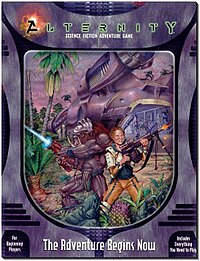Alternity

Alternity introductory boxed set
|
|
| Designer(s) | Bill Slavicsek, Richard Baker |
|---|---|
| Publisher(s) | TSR, Inc. |
| Publication date | 1998 |
| Genre(s) | Science fiction |
| System(s) | Custom |
Alternity is a science fiction role-playing game (RPG) published by TSR in 1998. Following the acquisition of TSR by Wizards of the Coast, the game was discontinued in 2000 as part of a broader rationalisation of TSR's business holdings, but it retains a small and devoted fanbase. Parts of Alternity as well as TSR's classic Star Frontiers game have been incorporated into the d20 Modern game, especially the d20 Future setting. The first campaign setting for the Alternity game, the Star*Drive setting, was introduced in 1998.
A new game called Alternity is due in 2017.
Characters were created with a point-based system, and could be either humans, mutants, one of several alien species presented in the core books, or original aliens created by the GM. Classes were replaced by professions, which dictated what skills and abilities were cheaper for any given hero to get, though a few skills (in particular, psionics) were restricted to specific professions.
Skills are classified into broad and speciality skills. Earning a specialty skill requires an associated broad skill, which requires a character to have sufficient associated ability points. Special skill is further classified into ranks, which affects the skill's scores. Skill scores are presented with the full score, half that score, and one-quarter that score. which represent the numbers needed to achieve Ordinary, Good, or Amazing successes in an action round respectively.
Unlike many other systems, actions are determined by a control die and situation dice. When Gamemaster calls for a roll, player rolls 1 control die and 1 situation die. The control die is always a 20-sided die, while situation die can be a 0, 4, 6, 8, 12, 20-sided die, where 0-sided die means the action only depends on control die roll. Situation die can be plus die or a minus die, in which the value in the situation die is added to or subtracted from control die value. The total of the rolled numbers is checked against character's action, skill, feat, to indicate a success or a failure. Rolling low is always better for successfully completing an action.
The type of situation die being used depends on the difficulty of the action. Difficulty is scaled in die types of -d20, -d12, -d8, -d6, -d4, +d0, +d4, +d6, +d8, +d12, +d20, +2d20, +3d20. A character's base situation die is +d4 for broad skill or feat check, +d0 for specialty skill or action check. A minus situation bonus means player uses a larger negative situation die set, while a plus situation penalty means a player uses a larger positive situation die set.
...
Wikipedia
